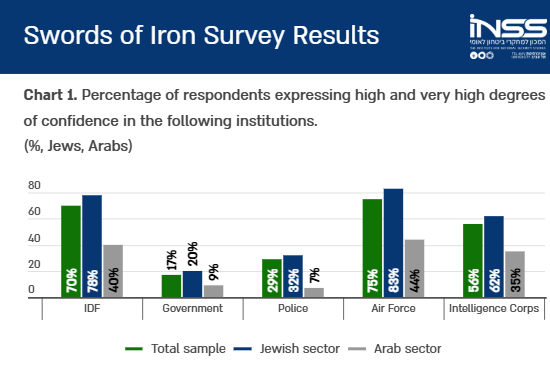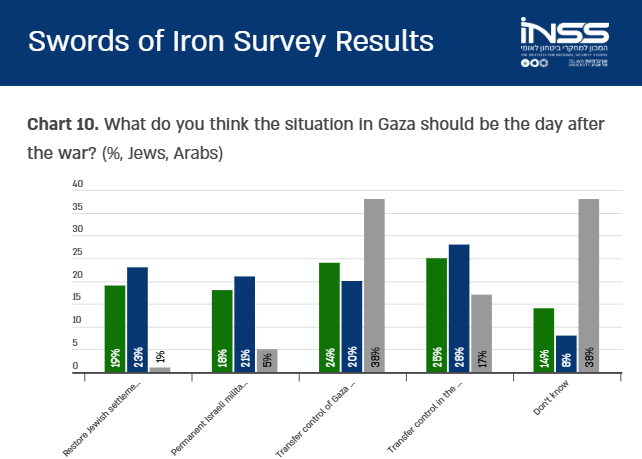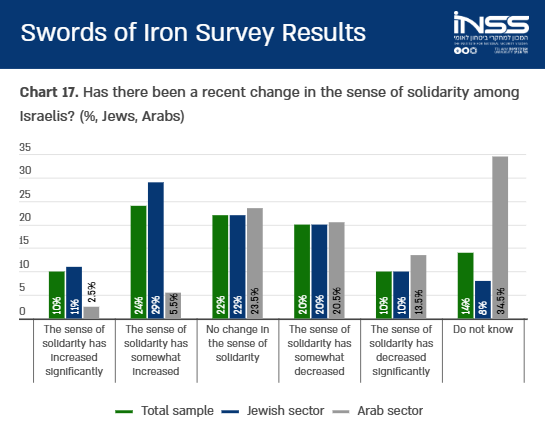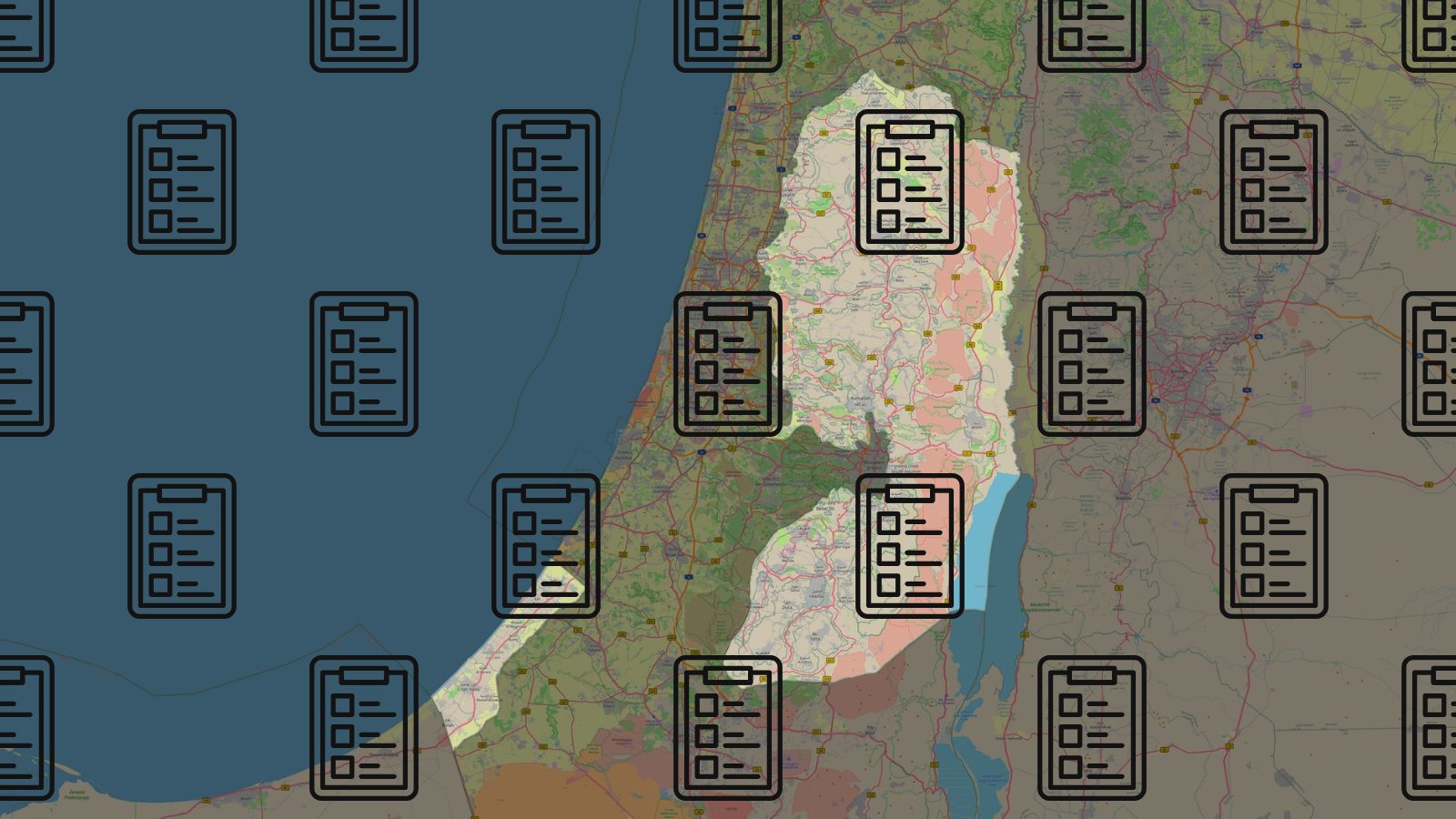Publications
INSS Insight No. 1904, October 30, 2024
As the war in Gaza—Operation Swords of Iron—continues, we examined the perceptions and attitudes of the Israeli public regarding the Palestinian issue as well as the functioning of the state in two rounds of focus groups conducted by INSS. The primary insights are that while the Israeli public does not have trust in state institutions, there is trust in the Israeli people themselves. Additionally, it will be impossible to improve Israel’s security situation through political agreement, and therefore, Israel should rely on military power alone. Moreover, the Israeli–Palestinian conflict is seen as not having any solution, and the establishment of a Palestinian state in Judea and Samaria is viewed as both an intolerable threat to Israel and as a reward for terrorism.
As the war in Gaza continues, we examined the perceptions and attitudes of the Israeli public regarding the Palestinian issue as well as the functioning of the state in focus groups conducted by INSS. The main insights were also partially supported by findings from opinion polls also carried out by INSS. The study included two rounds of focus groups. The first round was conducted three months after the outbreak of the war in Gaza, while the second was held six months later. Both rounds included three groups divided by age and family status: young people aged 22 to 28 without children; individuals aged 30 to 35 with children under age 12; and older people between 50 and 96 with children over the age of 16. There was equal gender distribution in the focus groups, and the participants’ places of residence represented the various regions of Israel. In terms of political affiliation, around half of the participants voted for right-wing parties (Likud, Religious Zionism, and Yisrael Beiteinu) in the previous election, while half voted for center-left parties (the National Union, Yesh Atid, and Labor).
Main Findings
- The State of the Nation and Personal Feelings Toward It
A fracture in national and personal security perceptions—All participants, including those who voted for right-wing parties, stated that their worldview before October 7 had been shattered. The participants testified that before the Hamas attack, they had trusted the security forces to protect Israel’s national security and their personal safety. However, the events of October 7 left many feeling betrayed by the Israeli government’s defense establishment. As one participant said, “I am living in fear. I do not feel protected. I do not feel as if the state is defending me.” The further we get from October 7, the less there is a sense of existential threat, but many still feel a lack of personal security, a sense that Israeli citizens have been abandoned and that the government does not care about their safety or personal needs.
Lack of trust in the government and its institutions—All participants, including those who identified as clearly belonging to the right-wing and Likud voters, reported that their trust in the government and the prime minister has been undermined in an unprecedented way. Given its failings, they believe that the government should resign and allow for new leadership to take over. At the same time, right-wing participants stated that a misguided doctrine, led by the defense establishment and backed by the media, was responsible for the October 7 attack and that capitulation to international pressure has prevented Israel from securing total victory in the war.
In contrast, trust in the IDF remains high, especially compared to trust in the political leadership and the government. This is supported by the findings of an opinion poll conducted by INSS. A survey in August found that 70% of the Israeli public expressed a high level of trust in the IDF, and 45% had a high level of trust in Chief of Staff Herzi Halevi. The IDF, therefore, continues to be an institution that enjoys public sympathy and trust. Especially among the younger members of the focus groups, there is a prevailing sentiment that “the army has learned the lesson and will not allow what happened to happen again.”

- The Political-Security Future in the Israeli–Palestinian Context
Lack of trust in the possibility of coexistence and agreements with the Palestinians—Participants in the focus groups expressed the view that Israel cannot rely on any agreement with the Palestinians being reached or implemented in the foreseeable future. The prevailing argument is that Israel has made many gestures toward the Palestinians over the years, both in Judea and Samaria and in the Gaza Strip, as part of agreements between the parties—providing electricity, water, and infrastructure—and the outcome was the October 7 massacre. They believe that the events of that day proved it is impossible for Israel to live in peace and establish good neighborly relations with the Palestinians, who, for nationalist and religious reasons, will not accept the existence of the State of Israel as the national homeland of the Jewish people. They claim that the two-state solution is no longer relevant, especially in the aftermath of October 7.
The notion that all Palestinians are Hamas supporters—This perception was evident among the participants, without any differentiation between Hamas, Fatah, and the Palestinian Authority. The message, as described by Prime Minister Benjamin Netanyahu that “Fatahstan is the same as Hamastan,” has resonated with the Israeli public. Since participants view all Palestinians (and, in some cases, Arab citizens of Israel) as supporters of terrorism, there is no room for negotiations with them toward a political agreement, and establishing a Palestinian state would be seen as a reward for terrorism and as a significant threat to the State of Israel.
The significance of the religious factor is increasing and even outweighs the territorial dispute—The prevailing opinion among the participants was that the root of the conflict is religious; therefore, the Palestinians will never accept the existence of Jews in a region they consider theirs. In their view, it is a zero-sum game, or as one person put it, “It’s us or them.” Compromise is not an option due to the assumption that the Muslims want to wipe out the Jews.
The approach of the “hawkish right” and the use of military power as a solution to the situation—Participants expressed the opinion that the State of Israel should rely on an aggressive, combative, and strong military, operating without any restraints that could hinder its might and determination to accomplish its missions. The significance of this belief, supported by opinion polls surveying the general public, is a rejection of any change concerning Israeli control and the IDF’s freedom of operation in Judea and Samaria, as well as the Gaza Strip.
Desire for separation from the Palestinians—Participants expressed a clear desire for separation between Israelis and Palestinians (“We are here, they are there”) and even for a border or clear demarcation between the populations. However, the Israeli settlements in Judea and Samaria were viewed as part of the State of Israel, and many believed the settlements contribute to Israeli security, as they necessitate a significant IDF presence on the ground and serve as “the first line of defense” for the center of the country.
Maintaining security control over the Gaza Strip—Most participants believe that Israel does not need to capture the Gaza Strip or take administrative control over the lives of Gazans and expressed opposition to resettlement in the area. At the same time, most argued that Israel should maintain security control in Gaza to prevent Hamas from rebuilding its military strength and to ensure no new threats emerge against Israel. In contrast, a poll conducted by INSS in March 2024 found that 24% of the public believes Israel should reestablish permanent settlements in Gaza. This finding appeared again (24%) in the INSS survey conducted in September 2024.

Israel is seen as overly dependent on the United States—Participants stated that Israel is “toeing the line” regarding the demands of the US administration, undermining Israel’s independence and security. Those who identified with the political right expressed the opinion that what appears to be capitulation to American demands has prevented Israel from fully utilizing its military force to defeat Hamas.
Based on conversations with participants in the focus groups, it is clear that most, especially the younger ones, have little knowledge about the roots of the Israeli–Palestinian conflict. They showed limited understanding of who the Palestinians are; what the Green Line is; which territories are under dispute; what the two-state vision entails; and the dangers posed by a single-state reality. In the absence of a vision or sense of optimism, young Israelis seem to prefer war over peace. The younger participants also pointed out that there is no political leadership offering them an ideological alternative to the sense of inevitable and perpetual conflict.
The future of the Gaza Strip—Among the participants, the solution that received the most support was the establishment of an international/Arab force to rebuild and stabilize the Gaza Strip. The findings of the INSS survey from September 2024 also revealed that 25% of the Israeli public supports handing over control of the Gaza Strip to an international body.
- Israeli Society
The leadership is disconnected from reality and the prevailing sense of chaos—Participants in the focus groups expressed that the political leadership is out of touch with reality, which explains the belief that state institutions are not functioning. Similarly, an INSS survey from August 2024 showed that only 17% of respondents approved of the government’s conduct at that time.
The public is concerned about the divisions and gaps within Israeli society and believes that only through unity can Israel address the challenges it is facing while expecting flexibility from the opposing political side—The INSS survey conducted in August 2024 shows that 41% of the public is greatly worried about the state of Israeli society on “the day after the war” and that 48% is more worried about social-political tensions in Israel than external security threats to Israel. Similarly, participants in the focus groups also expressed hope for political and social unity as the only way to navigate the challenging situation.

War is the only solution to the threat posed by Hezbollah and the challenge of returning those evacuated to their homes in northern Israel—This was the prevailing opinion, supported by the INSS survey from August 2024 and the focus groups. The survey found that 44% of the public believed Israel should launch a broad offensive in Lebanon, despite knowing that that could lead to an all-out regional war.
There is a desire for a leadership that can reunite the people. Participants in the focus groups repeatedly stated that the failure of the leadership is the main factor behind their sense of insecurity, along with the refusal to take responsibility for the October 7 disaster and the incoherent management of the military campaign. There is a strong desire for leaders who will unite and heal the people after a long and painful war, who will work for the good of the country and propose solutions to the crises, including a diplomatic plan.
Conclusion
Participants in the focus groups expressed painful feelings of desperation, depression, and a lack of faith in their ability to influence the rebuilding processes that Israel needs. There was also a clear loss of trust in the possibility of an agreement with the Palestinians, who are perceived as supporting Hamas. While the focus-group participants do not believe Israel is facing an existential threat, they feel a profound lack of security, especially given the perception that Israeli citizens are still being abandoned and the volatile domestic social situation. In addition, while trust in the state and its institutions was undermined by the events of October 7, the only body that participants agreed they could rely on was the Israeli people themselves, as demonstrated by the impressive mass mobilization of civil society in the aftermath of the Hamas attack, which filled the void left by the government in providing assistance to those injured and to soldiers called up in the initial stages of the war.



